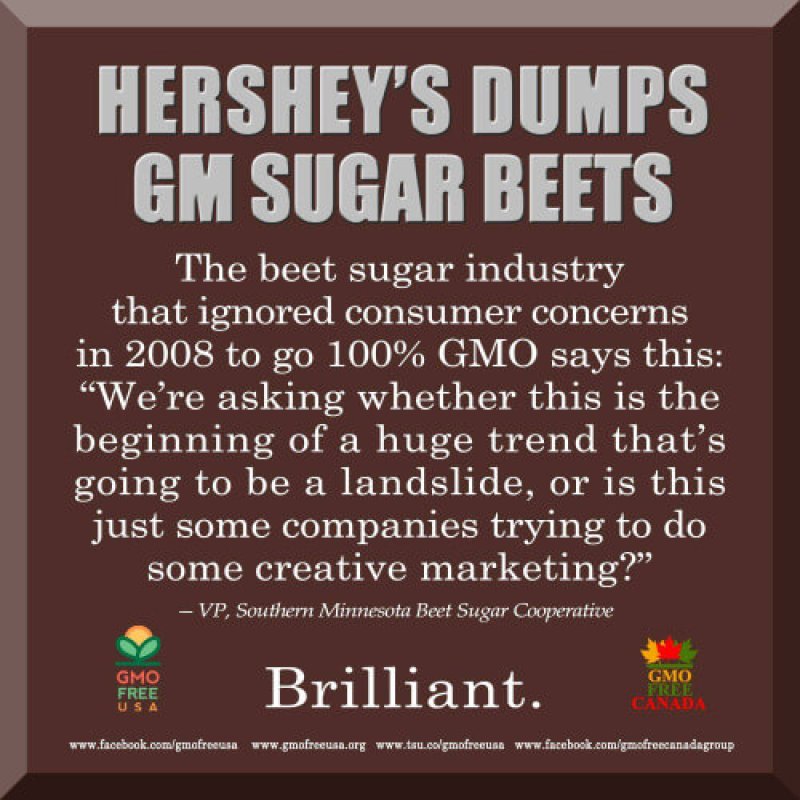Like most Americans, I had never heard of sugarbeets before I started researching genetically engineered crops. I don’t give much thought to the source of my sugar because I rarely use it (I’m salty, not sweet, as some of you may already know) and certainly never think about where the sugar in a Kit Kat comes from.
Apparently, over half of the sugar produced in the U.S. is from sugarbeets, a vegetable that grows underground kind of like a carrot. More than 5 million tons of sugar are manufactured each year from American sugarbeets. You’ve been eating it for years and probably didn’t even know because it’s end product, sucrose, is molecularly identical to cane sugar.
 But this poor veggie is now under attack by anti-GMO activists because sugarbeets are grown from genetically engineered seeds. Sadly, some sugar and candy companies — desperate for any health imprimatur as sugar is increasingly blamed for making us fat and sick — are dumping beet sugar. Why? Well, because, they are a GMO. I guess if the companies can console their sugar-eating customers that at least their obesity and diabetes will be GMO-free, that’ll make everyone feel better.
But this poor veggie is now under attack by anti-GMO activists because sugarbeets are grown from genetically engineered seeds. Sadly, some sugar and candy companies — desperate for any health imprimatur as sugar is increasingly blamed for making us fat and sick — are dumping beet sugar. Why? Well, because, they are a GMO. I guess if the companies can console their sugar-eating customers that at least their obesity and diabetes will be GMO-free, that’ll make everyone feel better.
Hershey’s announced last year that it would stop using beet sugar so it could claim its products are GMO-free. The company’s spokesman told me why in an email:
As a consumer-centric company, we listen to our consumers and work to respond to their interests and expectations. Non-GM ingredients is something our consumers are telling us is important to them. We have seen consumers’ interest in buying products made with non-GM ingredients grow, which is why we have shifted to buying mostly non-GM sugar and using 100% non-GM sugar for key brands.
At the same time, the company candidly says there’s nothing wrong with sugarbeets:
GM ingredients are safe. The international scientific community, including the American Medical Association, the World Health Organization….and the National Academy of Science have all examined the health and environmental safety of plant biotechnology. These organizations have concluded that GM ingredients are safe for human consumption.
So, a company that has safely used an ingredient for years — and still believes is safe – nonetheless will stop using the safe product because some consumers have been snookered into believing it’s unsafe. I see. And that same company will replace some American-grown sugar with “cane sugar from the same major sugar companies that also sell granulated sugar to consumers… most of that sugar is grow throughout Latin America.”
Got it.
The backstory here is that an activist group – GMO Inside – petitioned Hershey’s for two years, demanding the company stop using GMO sugar. Instead of telling them to Kiss Off (pun intended), Hershey’s capitulated, insisting they were responding to “consumers.”
Sorry, Hershey’s, no way in hell does anyone believe that millions of American housewives were scanning the ingredient list on the back of Kisses packages to see if they contained beet sugar (99.99 percent of the moms I know have no idea such a thing exists; I would be the other .01), then Facebooking and Tweeting Hershey’s to demand they get rid of the stuff.
To be fair, Hershey’s isn’t the only major food company to go sour on sugarbeets. Domino’s sugar products now have the Non-GMO Project’s butterfly logo, which means the company paid big bucks to tell consumers virtually nothing.
And since corporate marketing departments aren’t exactly known for originality, we can expect to see more food companies follow suit.
What’s the issue with GMO sugarbeets?
So what do activists have against the sugarbeet? I talked to Luther Markwart, executive VP of the American Sugarbeet Growers Association, which represents more than 10,000 farmers in 11 states. Markwart has sugarbeets in his blood so to speak; he grew up on a sugarbeet farm in Michigan (before the crop was genetically modified) where he would have to pull weeds on for five miles. “It was horrible work,” he said. “I hate weeds.”
About a decade ago, sugarbeet farmers approached biotech companies to help find a new way to stop the weed problem. Now for those of us who aren’t farmers, a weed problem on a farm isn’t the same thing as the weed problem in your suburban yard or brick paver driveway. Weeds kill crops, choke off needed resources like water and soil nutrients and require a lot of manpower (not to mention chemicals) to get rid of them.
A German seed company along with Monsanto developed a seed that tweaked the sugarbeet; instead of 27,421 genes, the new sugarbeet had 27,422 genes. The extra gene allowed the plant to tolerate an herbicide that would kill the weeds but not damage, poison or in any material way affect the sugarbeet. After several years of testing the crop and regulatory review, the new genetically engineered sugarbeet was approved for use. The association identified 25 environmental benefits from the GE sugarbeet, including fewer pesticides, less water usage, healthier plants and higher yields.
The genetically modified sugarbeets go through an extensive processing that destroys and removes any DNA. The beet is chopped up and diffused in huge pressure cookers to extract the sucrose in the form of raw juice. That juice is then clarified into a thin juice, which is where the DNA is removed. An evaporation process boils off most of the water from the juice, which is then crystalized into sugar. Voila!
Just to make sure the end product contained no DNA (that would mean no GMO ingredient), the industry hired an outside firm to test samples during every step of the process. By the time the sugarbeet got to the thin juice stage, neither DNA nor protein could be detected. The sugar is GMO-free even if it’s from a sugarbeet. And the ends result shows no difference between sugar from sugar cane or from a sugarbeet. Even rabid anti-GMOers cannot find any trace of the genetic engineering process in the final product. Sugar is sugar is sugar.
“Sucrose is sucrose,” Markwart said. “This is all about perception, not about science.”
Which is almost entirely the case with the GMO controversy. The most discouraging part is when companies that know the science nevertheless feed the ‘scare’ perceptions by capitulating to activists to don a fake health halo instead of just standing up for science and common sense, and challenging them. That should leave a bitter taste in everyone’s mouth.
Julie Kelly is a cooking teacher and food policy writer. She’s a National Review Online contributor and has been published in the Wall Street Journal, The Hill, Forbes and Huffington Post. Follow me on Twitter @julie_kelly2































